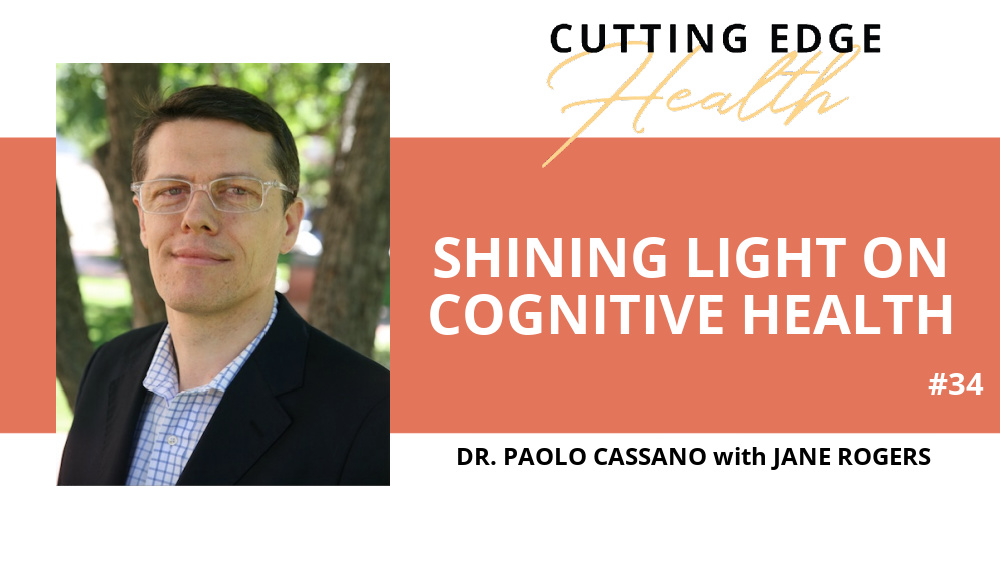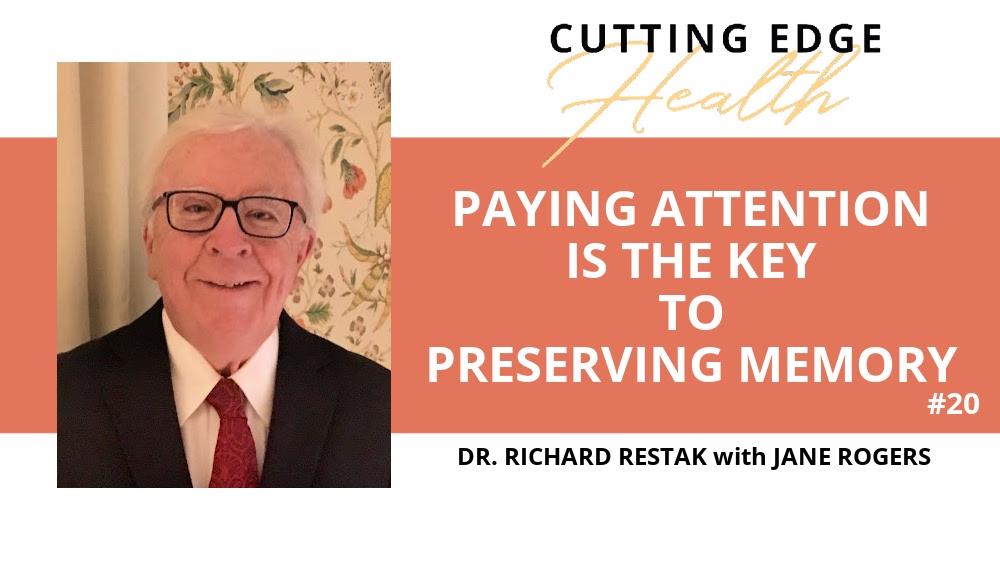
EPISODE #6
Fix it now for
a healthy brain later
Dr. Nate Bergman
with Jane Rogers
Don’t wait, there are things you can do today to keep your brain sharp.
What you'll learn in this podcast....
We think of cognitive decline as someone who is in a nursing home, who’s got drool coming out of their mouth and no longer recognizes their loved ones. That’s our concept of Alzheimer’s. But it’s much more useful to think about cognitive decline in the same way we think about cancer: it develops in stages.
You should look early because there are things you can do right now that will help your cognitive health in late life. “I’ve always been open to treating the whole person,” says Nate Bergman, DO, MBA, who serves as Chief Scientific Wellness Officer with Kemper Cognitive Wellness located in a Cleveland suburb. Exercise, sleep, stress management and most importantly nutrition are part of the solution for long term cognitive health.
A healthy lifestyle starts with healthy eating. Dr. Bergman has seen tremendous improvement in patients who changed their diet. Processed foods should be out for everybody. In addition, a vegan diet or a ketogenic diet can be excellent therapeutically. He encourages patients to keep a three-day diet journal or photo diary of all the food they eat, which may show patterns of eating that surprise people. Avoiding gluten can be another powerful intervention for many that often can show results in just a few weeks. Cutting out other foods that are typically inflammatory like dairy, soy or other allergens can often improve symptoms of cognitive decline.
To keep stress under control, Dr. Bergman advises getting up from your desk and stretching your legs regularly. Movement therapy in general has proved useful for stress management. Gadgets that monitor heart rate variability and your body’s ability to handle stress can help you identify and stay focused on the lifestyle changes that will contribute to a healthy brain and body.
Certainly one of the most effective things you can do is cross-training exercises that work the body and brain. There are three kinds of exercises when we talk about cross-training exercises. There’s cardiovascular resistance training where you’re pushing against something; high intensity cardio aerobic; and, thirdly, motor and coordinated movements like dancing or tai chi, anything that has steps and requires some coordination like Zumba, for example. Racquet sports, martial arts, yoga or movements that cross the midline, taking your right hand and crossing over to the left, have been shown to be especially helpful.
Sleep is among the most potent factors to address in maintaining cognitive health. Even very mild obstructive sleep apnea can be a problem because it is literally causing a little bit of brain damage every night.
Fixing dental issues, particularly periodontal issues that may harbor inflammation and infection is a factor in brain health that is often overlooked.
One of the most useful indicators is your blood pressure. If your systolic blood pressure gets above 140 and the bottom number starts to trend consistently in the 80s or the 90s, you have to stop and ask what’s causing this.
And finally, Dr. Bergman has learned it’s important to keep all these things simple so people can sustain and maintain them over time.
About Dr. Nate Bergman, DO, MBA
Chief Scientific Wellness Officer, Kemper Cognitive Wellness
“I have been passionate about proactive, preventive, and participatory health activation since my days as a research fellow at the NIH,” says Dr. Bergman. “My interest in brain health, prevention, and disease treatments was borne out of my own illness in the second and third years of medical training. I suffered severe memory loss and learned first hand what it feels like to “lose your mind.” The experience left me feeling frightened and isolated, but with the right team I was able to reverse it. This turnaround accelerated my interest in brain health.”
Dr. Bergman is a pre-eminent brain health physician in the United States. He completed his fellowship in geriatric medicine at Cleveland Clinic with emphasis on how to optimize the aging brain. Prior to joining the team at Kemper Cognitive Wellness, he co-developed the Cleveland Clinic Center for Functional Medicine’s program for cognitive impairment. Dr. Bergman organizes the “Bredesen Brain Board,” a mastermind group of 20 clinicians personally chosen by Dr. Bredesen for the work they are doing in brain health. Dr. Bergman is a co-author of the 2018 publication of “Reversal of Cognitive Decline: 100 patients” that reported outcomes of the first 100 patients treated with ReCODE. He received his Doctor of Osteopathy from Kansas City University and is Board Certified in Internal Medicine.
- Never miss an episode! Subscribe and follow on your favorite distribution channel.
- Feedback and questions to hello@cuttingedgehealth.com
- Ask your question directly to the doc
- Our team would be honored and grateful, if you could leave a 5-star rating on Apple Podcasts.


























